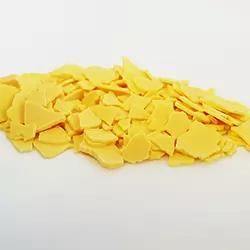IUPAC Name
disodium sulfide
Cas Number
1313-82-2
HS Code
2815.11.00
Formula
Na2S
Appearance
Light Yellow Powder
Common Names
Sodium sulfide anhydrous, sodium sulfide with <30% water of crystalization, sodiumsulphide, sodium monosulfide
Packaging
25 Kg Plastic Woven Bags
Sodium sulfide anhydrous has a formula of Na2S and exists mainly in the nonahydrated form, Na2S*9H2O. Anhydrous sodium sulfide is a white crystalline solid whereas sodium sulfide flasks are yellow in appearance. This is due to the presence of polysulfide in sodium sulfide flakes, giving its yellow appearance. However, both the anhydrous and hydrated forms are soluble in water and give a colorless alkaline solution readily.
Sodium sulfide adopts an anti-fluoride structure, where the smaller sodium ions occupy the larger sulfide ions holes in a crystal lattice and vice versa. It can also be oxidized when heated to yield sodium carbonate and sulfur dioxide. When exposed to air, sodium sulfide smells like rotten egg and this is due to the releases of hydrogen sulfide gas. In addition, sodium sulfide can be treated with sulfur to yield polysulfide.
Manufacturing Process
1. Laboratory Scale
Using small-scale laboratory method, sodium sulfide is manufactured by reducing sulfur with sodium in anhydrous ammonia. Sulfur can also be reduced by sodium in tetrahydrofuran solvent with minute amounts of naphthalene catalyst. Alternatively, sodium sulfide can also be manufactured from the reaction within each set of reactants such as (a) caustic soda and sulfur, (b) barium sulfate and soda ash and (c) sodium sulfite and coal.
2. Industrial Scale
Being the oldest method of production, sodium sulfide is manufactured by reducing sodium sulfate with powdered coal in a reverberator furnace. However, this method requires harsh reaction conditions such as high temperature of 900 and a specially designed furnace to withstand such temperature. A more efficient alternative would be to use barium sulfate, a different metal salt as the starting compound. Reducing barium sulfate does not require drastic reaction.
Sodium sulfide is used in textile dyeing and finishing. It can be used as a bleaching agent, serving as an alternative to sodium chlorite and hydrogen peroxide. It removes yellowish stains and spots that are not removed by laundering process. Sodium sulfide can also be used as a desulfurizing and a dechlorinating agent when dealing with leather materials. In addition, it is used to obtain sulfur black dyes, which can in turn be treated and processed to obtain other color dyes.
It is primarily used in pulp and paper industry in the Kraft process of manufacturing paper. It is a component of white liquor in addition to sodium hydroxide, and white liquor plays an important role in manufacturing wood pulp. It is involved in the first stage of the Kraft process or the impregnation step where the wood chips are impregnated with the white liquor.
It is used in water treatment process to aid in the removal of metal impurities from mining-influenced-water during treatment. Sodium sulfide is also used in chemical manufacturing as a sulfonation and sulfomethylation agent. In addition to that, it is used in the photographic industry to prevent and defend a developer solution from oxidation.
